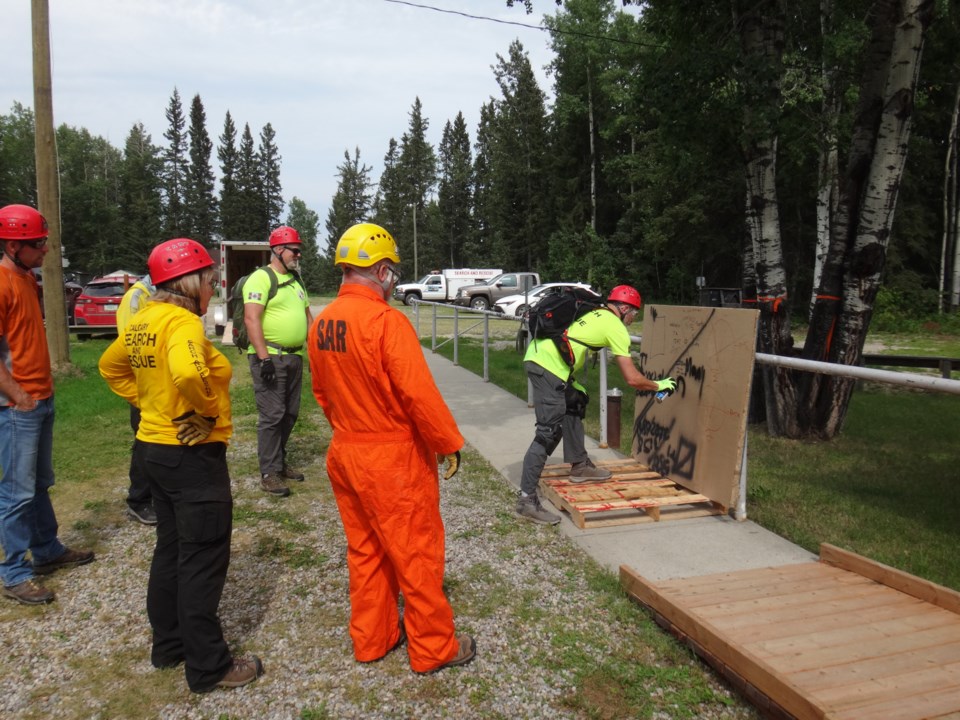MOUNTAIN VIEW COUNTY — When a natural disaster strikes, professional, full-time emergency crews only have so many resources available and must therefore triage – or prioritize – their response.
That’s where volunteers with search and rescue teams can play a crucial role not only in providing assistance to survivors but also coordinating the emergency response and by extension alleviating the load placed on the shoulders of police, fire and EMS crews.
Four regional search and rescue agencies recently participated in a specialized light disaster assistance response training course south of Sundre in the Bergen area, which on July 7 was hit hard by a tornado-producing storm.
The pilot training program, taught by Richard Smith and Dr. Scott Wright of SARI Canada, was hosted on the weekend of Aug. 20-21 by the Sundre Volunteer Search and Rescue Society with the objective of bringing members up to speed in the area of light disaster search and rescue.
The course involved a blend of theory the first day followed the next by practical, hands-on exercises that involved “simulated markings on building searches, and the extrication of individuals in simulated wall collapses,” reads a portion of a press release.
Joining the Sundre team were counterparts from search and rescue organizations in Calgary as well as Rocky Mountain House and Mountain View County.
“It went very well. It did remind me of the Pine Lake tornado, seeing a lot of the damage there along the Bergen Road,” said Smith, who is an instructor and trainer with SARI Canada as well as a search and rescue manager with both Mountain View and Sundre Search and Rescue.
“And I really felt with all my heart for the residents who live in that area, based on previous responses to disaster that I’ve had in the past. It was good to go there and assist them.”
Light disaster search and rescue training involves developing the ability to perform relatively uncomplicated search and rescue procedures for victims and survivors in situations that would pose minimal risk to the rescuer and that can be accomplished with bare hands, simple tools, and special techniques.
The training covered how to go about helping the 80 per cent of survivors who are easier to reach, as opposed to the five per cent who end up being rescued by highly trained urban rescue teams, reads the press release.
“It may come as a surprise that there is no standardized training of light disaster search and rescue techniques provincially, nationally, or across jurisdictions,” it states.
“The techniques and best practices taught are applicable in both natural or man-made disasters, and in particular involve safely navigating building-to-building searches, first aid, rescue and recovery.”
Although an evolution of emergency preparedness training, the course was part of ongoing efforts to keep sharp volunteers’ skills.
“We’ve been doing this training somewhat on-and-off since the Pine Lake tornado,” said Smith, who lives northwest of Water Valley.
“So, it’s nothing new. Search and rescue groups in Alberta have been completing this kind of training, but not as formalized as this particular course.”
The new pilot course had initially been intended for 2020, but those plans were derailed by the COVID-19 pandemic.
“The training’s been lined up for about two years,” he said, adding the course was geared toward volunteers who were already trained on search and rescue basics.
The course also demonstrated how to get organized in the wake of a disaster to help survivors, keeping in mind the safety of rescuers while doing the most good for the most people.
“We have more of the ground search and rescue teams getting the training and development to provide that hasty team service to the municipality when a tornado or a sudden severe weather or other event occurs to assist them with giving a windshield survey as to what’s actually out there,” he said.
Prior to going out into the field to conduct such an assessment following a natural disaster, he added search and rescue teams must also first have pre-authorization from the affected municipality’s emergency operations centre.
In a nutshell, a windshield survey – sometimes alternatively referred to as a rapid life safety and damage assessment – involves accurately documenting the situation at the scene of a disaster and relaying information about for example casualties as well as damaged buildings and infrastructure to facilitate an emergency operations centre’s ability to allocate resources and respond more effectively and efficiently, he said.
“And that frees up police, fire and EMS to concentrate on their jobs and respond to what they have to fulfill in their functions,” he said.
The training was also developed in part by drawing from lessons learned in the U.S. by organizations such as the Federal Emergency Management Agency, ERI International and SARI Canada.
“I think it’s long overdue that we use ground search and rescue here in emergency management, because typically we’ve seen elsewhere in the world, that search and rescue is the backbone of emergency management,” he said. “We can all work together.”
Offering advice to anyone who’s given some thought to joining their local search and rescue organization, Smith said, “It’s always a great honour and privilege to be able to serve one’s community. There’s nothing greater than putting something back into the community.”
There are many ways to contribute to one’s community, and getting involved with a search and rescue team is one such option, he said.
“This is all about emergency services all working together to save lives and to make a difference to people under stress during these critical incidents,” he said.
“And that’s very important. We can all make a difference.”



